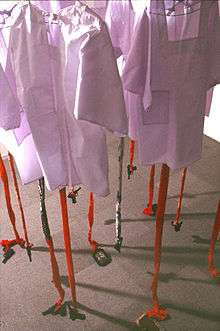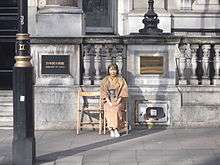Yoshiko Shimada
| Yoshiko Shimada | |
|---|---|
 Tied to Apron Strings | |
| Born |
1959 Tachikawa, Japan |
| Nationality | Japanese |
| Education | Scripps College |
| Notable work | Shooting Lesson (1992), Tied to Apron Strings (1993), Bones in Tansu: Family Secrets (2004), Becoming a Statue of a Japanese Comfort Woman (2012) |
Yoshiko Shimada (嶋田 美子 Shimada Yoshiko, born 1959) is a Japanese video artist and performance artist [1]who has been called "Japan’s premier feminist and antiwar artist." [2] She was born and raised in the Tachikawa section of western Tokyo, the site of a US air force base, which gave her early exposure to US-Japan postwar tensions during the tumultuous 1960s.[3] [4] She graduated with a BA in Humanities from Scripps College in 1982.[5]

Among the themes she explores are cultural memory and the role of women in World War 2 as both aggressors and victims. Her 1992 etching Shooting Lesson, for example, juxtaposes portraits of four Korean comfort women with a photograph of the wives of Japanese military police stationed in Korea receiving shooting lessons for self-protection against the local population.[6] In her 1993 installation Tied to Apron Strings, she uses white aprons as both a symbol of domesticity and motherhood and as a reminder of the uniform of the Dai Nippon Fujinkai, a women's patriotic organization of World War 2 Japan. [7] Shimada's interactive installation Bones in Tansu: Family Secrets, in which she solicited the war memories of museum visitors and incorporated them into the exhibit, first appeared in Tokyo in 2004 and then in seven other locations around the world.[8] She performed Becoming a Statue of a Japanese Comfort Woman outside the Japanese embassy in London in 2012.[9]
Shimada's works are held by the New York Public Library, Tokyo Metropolitan Museum of Photography, Keio University Art Center, Kyoto Seika University, and City University of New York.[10] She has had solo exhibitions in Japan, Hong Kong, the Philippines, Canada, and the United States, and her work was included in the 2002 Gwangju Biennale in South Korea.[11]
Shimada has been included in the Asian American Arts Centre's digital archive.[12][13]
References
- ↑ http://www.jetaa.org.uk/events/art-performance-and-activism-in-conversation-yoshiko-shimada-and-soni-kum/
- ↑ "Feminist Charts No Woman's Land between Peaceniks and the SDF". Retrieved 7 March 2015.
- ↑ "Catalog". Retrieved 7 March 2015.
- ↑ "Artist Biography". Retrieved 7 March 2015.
- ↑ "Artist Resume". Retrieved 7 March 2015.
- ↑ "Leza Lowitz, "Past Imperfect," Tokyo Journal (August 1992): 41-42". Retrieved 7 March 2015.
- ↑ "Artist Statement". Retrieved 7 March 2015.
- ↑ "Rebecca Jennison and Laura Hein, "Against Forgetting: Three Generations of Artists in Japan in Dialogue about the Legacies of World War II," The Asia-Pacific Journal Vol 9, Issue 30 No 1 (July 25, 2011).". Retrieved 12 April 2015.
- ↑ "Fight For Justice". Retrieved 13 April 2015.
- ↑ "Artist Resume". Retrieved 7 March 2015.
- ↑ "Artist Resume". Retrieved 7 March 2015.
- ↑ artasiamerica digital archive
- ↑ "Shimada, Yoshiko". Retrieved 24 June 2013.
Further Reading
- Borggreen, Gundhild (2013). "Archives of Secrecy: Yoshiko Shimada's Art Project Bones in Tansu--Family Secrets." In Borggreen, Gundhild; Gade, Rune. Performing Archives/Archives of Performance. UK, Ireland, and Scandinavia: Museum Tusculanum Press. pp. 403–417. ISBN 9788763537506.
- Osborne, Catherine, Yoshiko Shimada, and Meg Taylor. Divide and Rule: Yoshiko Shimada. Toronto: A Space Gallery, 1997. ISBN 978-0969506874
- Shimada, Yoshiko. Art Activism 1992-98. Tokyo: OTA Fine Arts, 1998.
- Yu-Rivera, Helen. "Demystifying the Japanese Household: Bones in the Tansu," Ctrl+P Journal of Contemporary Art 4 (December 2006): 2-4.
|